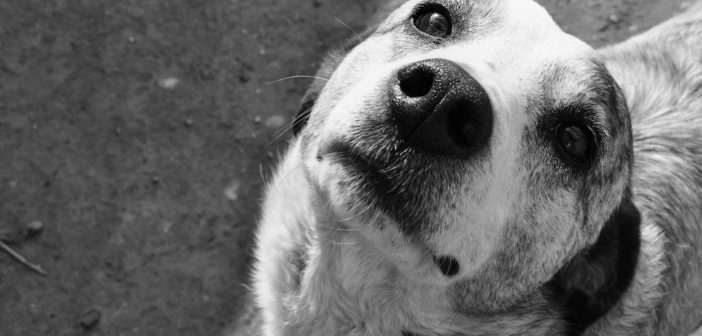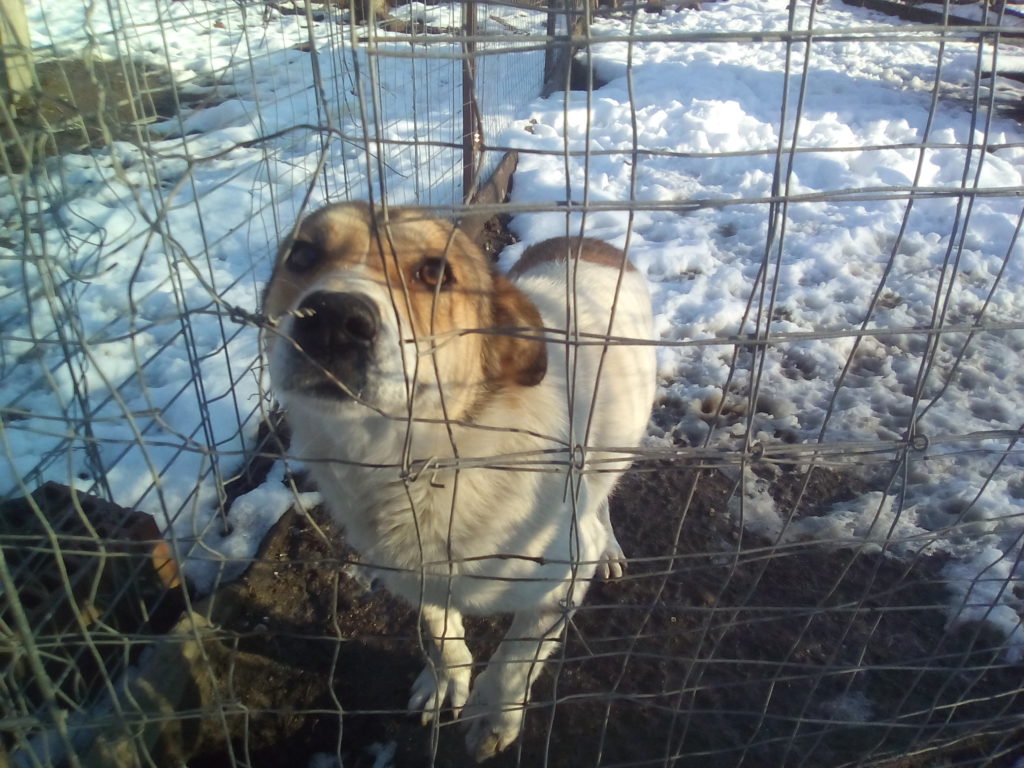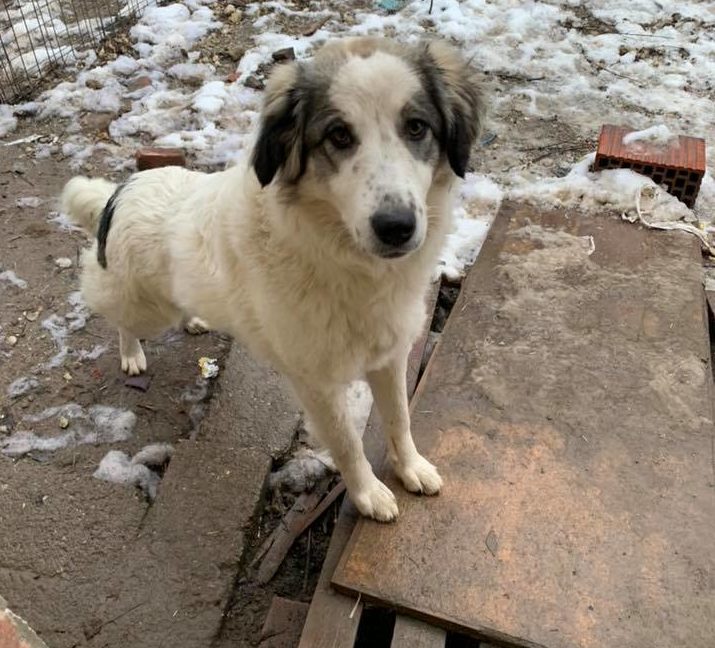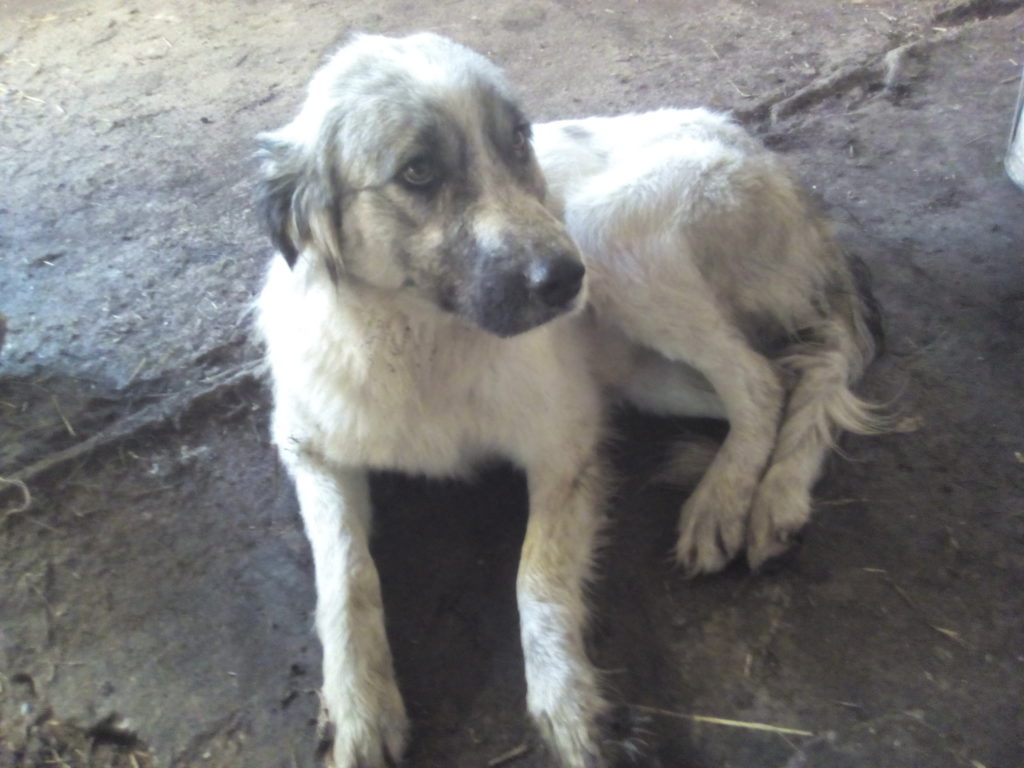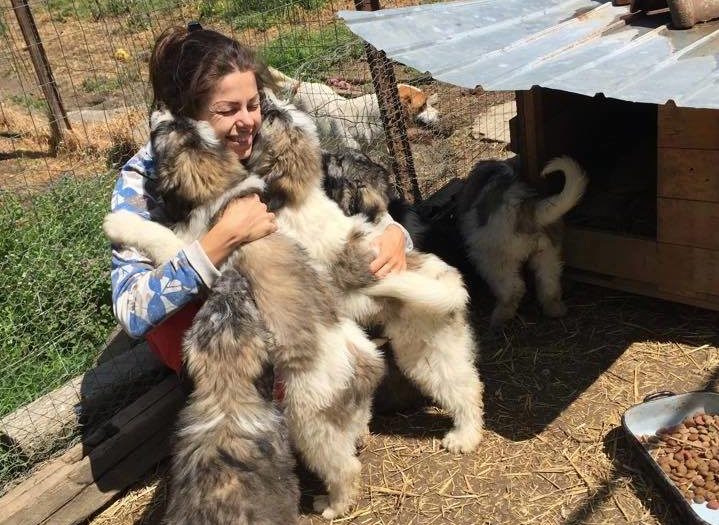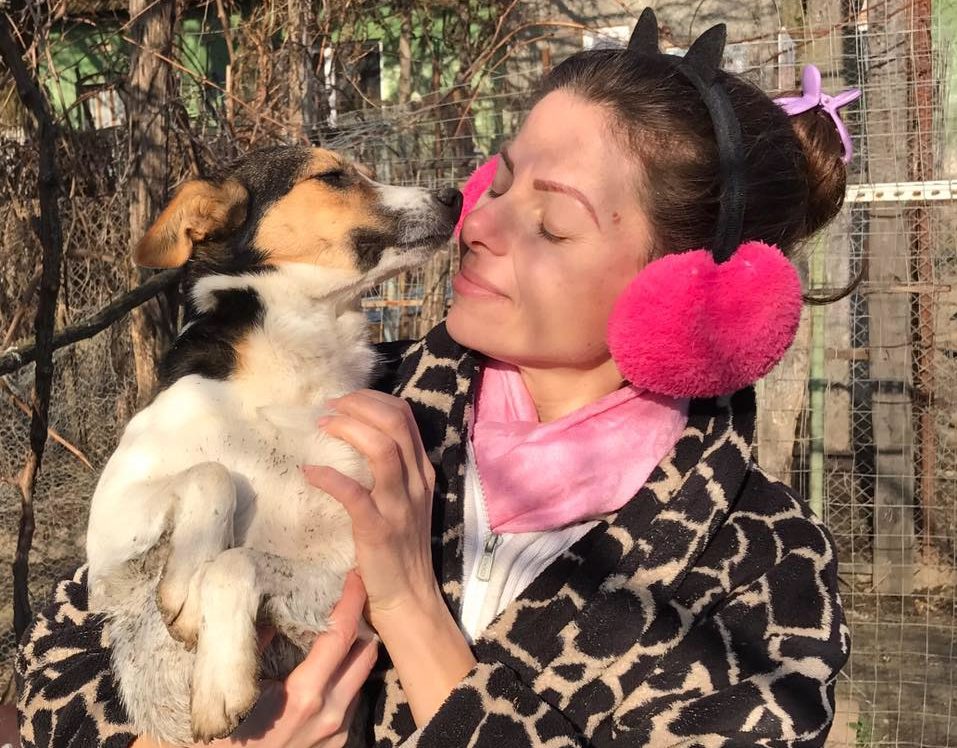Cristina Blaj works hard to help protect neglected and abused dogs, with little outside financial support and little other than misunderstanding and disapproval from her local community. Having supported Cristina’s rescue work for several years, I decided to visit her so I could see first-hand how she works and what “dog rescue” means in Romania, a country not known for compassion towards animals.
Cristina collects me from my hotel in the Southwestern Romanian town of Buzias, which lies 12 kilometers South of her home in the village of Racovita. Buzias is a spa town with echoes of former glory; its waters run red and warm and the local park is surrounded by an intricately carved Victorian wooden walkway, which comes alive in the summer, but now provides a meager shelter for stray dogs.
The weather is bleak; the temperature is below zero and there is a constant wind with blizzards of snow. The land around is a characterless, flat expanse with little vegetation or any other obvious signs of life. This is the worst time of year to be a homeless dog, as there is little food to scavenge, no shelter, and water sources are frozen over.
Our first port of call is a group of five giant sheep dogs, one of Cristina’s daily drop-off points. We pull into a lay-by which is a regular dumping ground for unwanted dogs: pregnant mothers, boxes of puppies, old working dogs no longer serving a purpose, or friendly but frightened pets who the owners have simply tired of. This long, straight stretch of road trails off into the fog. Any dog left here is likely to be killed by a speeding vehicle, a small mercy when slow starvation is the alternative.
There are no dogs alive here today, just the body of a large black dog who clearly outlived his usefulness, lying amongst the trash. The belt is still tight round his neck. Perhaps he killed one of his owner’s chickens, a common hanging offence. On either side of him lie the bodies of two dead sheep. I try not to think about why these poor creatures met their deaths in such a brutal way.
We drive on. Although the sheep dogs we are heading for are owned by a farmer, they are left to fend for themselves and will attack strangers. At least they have thick winter coats and straw bales to curl up on, though they do so beneath an open hangar, which does nothing to protect them from the piercing wind. While I stay in the car rather than risk being bitten, I can make out their giant silhouettes as they bound up to Cristina, matted tails wagging while she pours out a pile of dry food for them to devour.
One more daily stop before heading to Cristina’s home to meet the dogs in her care. This is another disused hangar on desolate ground, where around ten dogs gather to fend off the cold in the straw-lined beds Cristina has left there. She says she would like to leave proper kennels there, but that would only draw attention to the dogs and they would not be treated kindly.
At first sight of the car, the dogs run excitedly alongside us, and this time I join Cristina to feed them. These dogs are less wary of me; a handsome black one sniffs at my hand, unsure whether to play or risk a friendly pat on the back. A lone small female keeps her distance, afraid of the bigger dogs, and we cross the thick snow to give her a share of the food.
I am pleased when Cristina tells me that the sheep dog here has a lifeline with a rescue organization in the United Kingdom, if only we can catch him and put him in the car. We try to pick him up – he must weigh 20 kilograms – but he growls and Cristina says she will need a little more time to earn his trust but will try again in a week or so. But all is not well here; two puppies are sick, and they weakly run away and hide beneath a rusting car bonnet. We catch the terrified pups and put them in the car to bring them to the veterinary clinic in the nearby city of Timisoara.
In the city, the vet confirms that the two puppies both have canine parvovirus, or “parvo,” a contagious and potentially deadly virus. Their chances of survival are slim, but they are in the best place now for medical care and their young age means they are more likely to find a loving home abroad if they can just pull through. Parvo is a constant risk for discarded puppies, and it takes seven days for symptoms to appear. Then there is also the danger of contracting distemper, another viral disease, which takes three weeks to show its symptoms.
We head back towards Cristina’s village of Racovita, but within minutes Cristina’s phone rings. There are four dogs abandoned on a roundabout on a busy main road in the city center. Can she help? We head straight there but the dogs are nowhere to be seen. If the dogcatchers are told, they will take the dogs to the local kill shelter. Cristina is told that the dogs live on the grounds of a nearby church, but she asks there and the priest knows nothing about them. Disheartened, we give up hope of finding them today.
A large portion of the day has escaped us now, and Cristina still needs to collect her pet passports from the vet for the dogs who will be sent to an organization in the UK later this week. She also has an appointment with her lawyer to discuss the possibility of a legal challenge to her impending eviction.
Cristina’s neighbors have long hated her rescue work. They don’t understand her compassion and believe she must either be crazy or selling the dogs for a profit. After a complaint was lodged to the village council, Cristina now has just a few weeks before being evicted from her family home.
I ask about the future: where will she go and what will become of the dogs? She will need to find homes for as many of the dogs in her care as possible, many of whom are older and have only ever known life in an outdoor pen, so would not adapt easily to a home environment. She would like to buy some land on which to build a new home and kennels, but I am surprised at the high cost of property in this part of Romania. All available nearby properties are far beyond Cristina’s reach.
I wait in the veterinary office while Cristina’s dog passports are prepared and stamped. The vet’s resident cat jumps onto my knee and we sit together while the documents are checked. I reflect on the contrast between this friendly, well-fed cat and the starving animals outside. Clients come and go with their pedigree pooches. It’s a different world in here.
Then, finally, to the lawyer. I wait outside in the car, the engine running to keep the heating on; it would only take ten minutes for the temperature to drop to uncomfortable levels and my toes have already been frozen once today. After half an hour, Cristina returns with some good news, which lifts our spirits. Her lawyer has found a similar case in the north of the country, where last year a rescuer faced eviction, but they managed to extend the notice period to a year. He also advised her that the village council cannot legally dictate how many dogs she can keep on her property, although this is a moot point now.
It is growing dark and Cristina has one last dog she wants to visit before taking me back to my hotel. I shall have to visit the dogs at her home tomorrow; I intend to photograph them and share albums on social media in an effort to find adopters.
We drive out to a truck stop with a ramshackle shed made of corrugated metal sheets. Inside, a timid Labrador hides and I stand back while Cristina feeds her. She has already lost a litter of pups to the passing traffic on the road that runs past just a few feet from her make-shift den, and Cristina is trying to persuade her owner to spay her and prevent the same thing from happening time and again. But like the other owners Cristina speaks to, he won’t consider it, even though she has offered to bear the cost herself.
As we head back to the hotel, I look forward to my warm room, satellite tv and comfortable bed and count my blessings that I am only here for a week. For Cristina, this has been her life for ten years, and every day brings new challenges and heartache, but she carries on trying to make the world a better place for the discarded animals she finds. The only physical help she has is from her mother, who has arthritis, but who, like Cristina, tirelessly cares for the dogs year-round. Cristina doesn’t know what she will do about her impending eviction, especially when it comes to the many dogs in her care, but love and compassion pushes her to keep fighting to help them.
You can find Cristina on Facebook here, and learn more about the work she does to help dogs in need. I know I can speak for Cristina when I say a heartfelt “thank you” to all those who support her, past present and future.
Featured image: A Romanian street dog looks up sweetly. Cristina helps as many dogs like this in need as she can. Image credit Giusi Barbiani, CC BY-SA 3.0.

